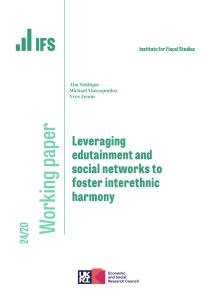This paper estimates the impact of schooling on the earnings of men. It is important to know what the return to educational investments might be since a high return to such investments may imply that individuals, for whatever reason, are investing in too little schooling. The major preoccupation in this literature has been the attempt to unravel the simultaneous relationship between schooling and wages. That is, wages depend on schooling since schooling enhances human capital, but schooling decisions depend on wages for one or more of a number of reasons - for example, individuals will invest more in schooling the greater is the return to that schooling. Traditional estimates of the return to an additional year of schooling in the UK has suggested that this return is of the order of 7%. However, several recent US studies and our earlier work (Harmon and Walker, American Economic Review, December 1995), based on UK data, suggest a much larger figure - in excess of 15%. This earlier work made the critical assumption that wages are linearly related to years of schooling and exploited the changes in the minimum school leaving age that have occurred in the UK to infer the returns to an exogenous increase in the amount of schooling. This paper examines the robustness of this important result to the linearity assumption and to the way in which we infer the effect of an exogenous increase in education. Effectively, we use the variety of changes that have occurred in education policy since the Second World War and variations in youth labour markets to provide an estimate of the effect of an additional year of schooling on male earnings. Our current analysis uses the General Household Survey, pooled from 1974 to 1994, and finds that the results in our earlier work are surprisingly robust. We find that the estimated schooling/earnings relationship is close to linear and the estimates are essentially independent of how we unravel the simultaneity between schooling and wages.








